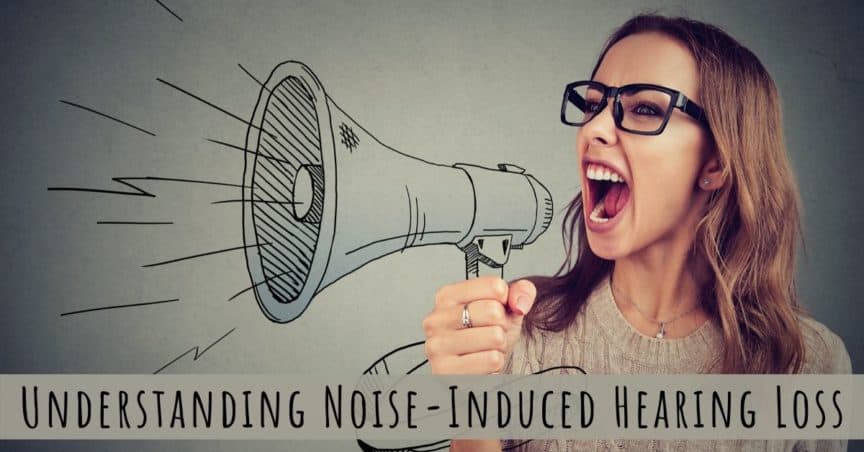- How to Care for Infants With Hearing Loss - April 15, 2024
- Hearing Aid Tips for Runners - April 5, 2024
- Overcoming Misconceptions Around Hearing Aids - March 27, 2024
We experience noise almost constantly. We may wake up with the sound of an alarm, drive through traffic, have numerous conversations, and listen to podcasts or music throughout the day. Our evenings may be filled with socializing in environments with background noise, watching television, talking on the phone etc. These noise levels are typically considered normal and are not harmful to hearing health. However, exposure to increased levels of noise can be dangerous and can cause hearing loss.
How We Hear
The process of hearing utilizes the many structures, bones, and nerves located in the ear which is comprised of three main components:
- Outer Ear: consists of the skin and cartilage that is most visible in addition to the ear canal and ear drum. The eardrum separates the outer ear from the middle ear.
- Middle Ear: composed of the ossicles – three small bones (among the tiniest in the human body) – and the Eustachian tube which is a canal connected to the upper throat and back of the nose.
- Inner Ear: is home to the cochlea, a labyrinth like structure filled with hair cells and fluid, and nerve pathways.
We absorb sound from the environment through the outer ear. The sound travels down the ear canal and lands on the eardrum causing it to vibrate. This moves the sound through the middle ear and with the help of the ossicles, the sound waves are pushed further into the inner ear. This activates the cochlea and the movement of the hair cells and fluid which convert the soundwaves into electrical impulses that are then sent to the brain (through nerve pathways) for processing.
Noise-Induced Hearing Loss
There are a few factors that can contribute to hearing loss including existing medical conditions, genetic history, and environmental exposure to loud noise. Consistent absorption of loud noise (short or long duration) is dangerous for your hearing health. This includes:
- Frequently attending concerts or sporting games
- Operating loud machinery
- Working in loud environments (construction sites, airports, performance venues, arenas, factories, military etc.)
- Gun ranges
Exposure to loud noise can cause damage in the inner ear, specifically to the hair cells in the cochlea. The louder the noise, the stronger the vibration is causing the hair cells to move and bend more. This is part of the process of translating the soundwaves into electrical signals for the brain to make meaning of. Constant movement of these hair cells can cause them to lose sensitivity and work less effectively. This is how most of us have experienced short term hearing loss. It is common after leaving a concert or other loud event, to have difficulty hearing clearly. You may be talking loudly, need others to talk loudly to hear them, and experience tinnitus which is a ringing or buzzing noise in one or both ears. This is precisely because all of the loud noise you have absorbed has exhausted the hair cells in the cochlea. After a short period of time, your hearing typically comes back because your ears have rested.
When someone consistently takes in loud noise and the hair cells do not have time to rest, the impact can be severe. Unlike other types of cells, hair cells do not regenerate. Humans are born with all the hair cells we will ever have which is thousands in each ear. This means that when they are damaged, this is permanent, resulting in hearing loss.
Preventative Tips
It is so important to be mindful and protective of your hearing health! There are several ways to do this including the following:
- Wear protective gear: there are numerous options that are easily accessible such as ear plugs, ear muffs, headphones etc. Wearing protective gear decreases the amount of noise you absorb from the environment.
- Avoid noisy environments: if you can, take alternative routes to your destination to avoid construction sites or highly trafficked areas.
- Create barriers at work: if you work in a loud environment, place a physical barrier between yourself and the source of the noise. You should also discuss your options with Human Resources and see if moving areas is possible.
- Take listening breaks: your ears need rest so be sure to take breaks from listening to music or podcasts.

